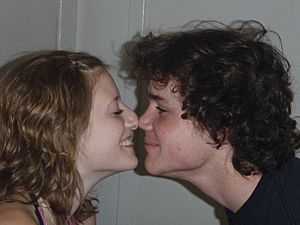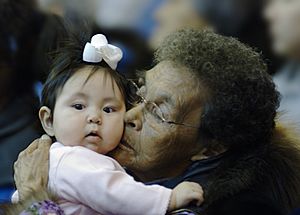Eskimo kissing facts for kids

The Eskimo kiss is a special way of greeting someone by gently rubbing your nose against theirs. It is also known as a kunik or nose rub. Many people see it as a friendly way to say hello in different parts of the world.
Contents
Where Did the Name Come From?
When early explorers first met the Inuit people in the Arctic, they saw them greeting each other by rubbing noses. The explorers called this "Eskimo kissing." The Inuit often only had their noses and eyes showing when they met outside in the cold. Many Inuit prefer to call this greeting kunik. This is because the word "Eskimo" can sometimes be seen as disrespectful to their culture.
Greetings Around the World
The Inuit and the Kunik
The Inuit people use a traditional greeting called a kunik. It is a special way for them to show affection and say hello.
Other Nose Greetings
Other groups of people also have similar ways of greeting. For example, the Māori people of New Zealand use a greeting called the hongi. People in Hawaii use a similar greeting called the honi.
Mongolian nomads in the Gobi Desert also have a similar practice. You can find nose-rubbing greetings in some Southeast Asian cultures too. This includes people from Bengal, Cambodia, Laos, Thailand, Vietnam, Timor, Sabu, Sumba, and Ibans. Nose kissing is also a traditional greeting for Arab tribesmen when they meet members of their own tribe.
 | Dorothy Vaughan |
 | Charles Henry Turner |
 | Hildrus Poindexter |
 | Henry Cecil McBay |


